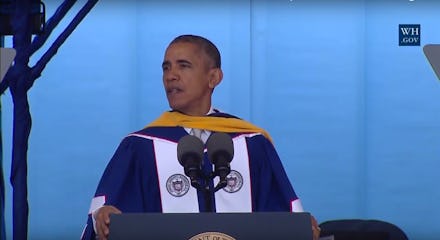Obama's Howard University Commencement Speech Was One of the Best and Blackest He's Given

President Barack Obama delivered stirring remarks about the state of American race relations at Howard University commencement Saturday afternoon. The president highlighted the progress of black Americans have made since his graduation from Columbia University in 1983, but also set forth a blueprint for the future.
"Change doesn't happen every four years," the president said. "Change is the effort of committed citizens who hitched their wagons to something bigger than themselves and fight for it every single day."
The speech was unapologetically black, quoting black author Zora Neale Hurston, lauding singer Prince and applauding activists in the Black Lives Matter movement who fight for racial justice. Echoing his 2008 speech on race relations, "A More Perfect Union," Obama urged the students at the historically black college to embrace their heritage and affect systemic change through the political process.
"Be confident in your heritage. Be confident in your blackness," the president said.
"Be confident in your heritage. Be confident in your blackness." — Obama at Howard
Though Obama enumerated the issues facing young black people today — mass incarceration, the wage gap and the school-to-prison pipeline — he began by recapping the progress that black Americans have made since he graduated from Columbia University in 1983. Obama noted that at the time, only 10% of black Americans held college degrees. That number is now 28%. The ranks of American millionaires and CEOs are blacker than they've ever been. The president even cited showrunner Shonda Rhimes' domination of Thursday night programming on ABC as evidence that black Americans have made enduring progress.
Obama then asked Howard graduates a rhetorical question: In what time period of American history would you want to be born? He answered: "If you had to choose a time to be, in the words of Lorraine Hansberry, 'young, gifted and black' in America, you would choose right now."
The president praised Howard alum, author and Atlantic national correspondent Ta-Nehisi Coates, who won the National Book Award for "Between the World and Me," an epistolary memoir about being black in America, and wrote a 2016 series of Marvel's comic Black Panther. Like Coates, Obama explained, black people do not have to choose between pursuing one genre of writing or the other. They can do both. They can achieve both. Obama also encouraged students to embrace their own style and sexuality like the late musician Prince.
"We've got a justice gap."
Many issues still require the attention and work of the class of 2016, the president said.
"We've got a justice gap when too many black boys and girls pass through a pipeline from underfunded schools to overcrowded jails," Obama said.
The president reminded graduates that their blackness gives them unique insight into the struggle against inequality and racial injustice.
"We can't walk by a homeless man without asking why a society as wealthy as ours allows that state of affairs to occur," he said. "We can't just lock up a low-level dealer without asking why this boy, barely out of childhood, felt he had no other options. We have cousins and uncles and brothers and sisters who we remember were just as smart and just as talented as we were but somehow got ground down by structures that were unfair and unjust."
Obama called on graduates to "expand [their] moral imaginations to understand and empathize" to understand struggles that are different from their own. Obama mentioned refugees, immigrants, the rural poor, transgender people and even middle-aged white men whose world has been "upended by economic and cultural and technological change and feels powerless to stop it."
"You gotta get in his head, too," Obama said.
"Not just hashtags, but votes."
Obama stress to graduates that passion, while pivotal to progress, must be coupled with participation in the political process, which includes voting.
"I want you to have passion. You have to have a strategy. Not just awareness, but action. Not just hashtags, but votes," he said. "To bring about structural change, lasting change, awareness is not enough. It requires changes in law, changes in custom."
He spoke candidly about the initiatives he was unable to pass because of lack of cooperation from Congress, and gave graduates a light chiding for low voter turnout among youth during midterm elections.
"You don't think that made a difference? What would have happened if you would have turned out at 50, 60, 70% all across this country?" Obama asked. He added that, though there are still barriers to voting in America, they pale in comparison to the barriers their grandparents and great-grandparents faced, such as illogical tests that forced black people to guess how many bubbles were on a bar of soap.
Obama closed his speech by asking students to recognize that, even if they believe they are 100% right, democracy is built on compromise. In one of his rare nods to the issue of free speech on college campuses, Obama said students should allow others to speak, even if they disagree.
"A Terrific Speech"
Those watching in person and watching at home heaped praise onto the speech, with many commenters getting emotional.
Obama's remarks begin at the 1:32:00 mark below.